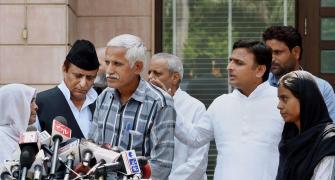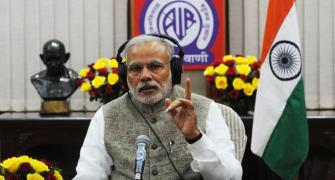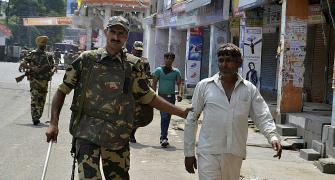 National Commission for Minorities suspects there was "pre-meditated planning" behind the Dadri lynching incident and termed "disturbing" controversial statements by politicians to "make capital out of such outrages".
National Commission for Minorities suspects there was "pre-meditated planning" behind the Dadri lynching incident and termed "disturbing" controversial statements by politicians to "make capital out of such outrages".
In an apparent criticism of Bharatiya Janata Party leaders who made controversial comments after visiting Bishada village, where 52-year-old Mohd Iqlakh was lynched over a rumour that he had eaten and stored beef, NCM said such statements further
"vitiate" the relations between different communities.
These should be stopped at all cost or "things will go out of hand", added NCM, which had a three-member team headed by its chairperson Naseem Ahmad making a visit to Bishada village.
"The team feels that a crowd of large numbers appearing within minutes of an announcement from temple's loudspeaker and at a time when most villagers claimed they were asleep seems to point to some pre-meditated planning.
"The facts as reported to the NCM team point strongly that the whole episode was the result of planning in which a sacred place like temple was used for exhorting people of one community to attack a hapless family," says a report prepared by the three-member team.
NCM said it will be "quite an understatement" to say that the killing was merely an accident "as has been claimed even by some persons in authority" -- a clear reference to a statement by Union Minister Mahesh Sharma and some other BJP leaders.
It added that what is more disturbing is that responsible persons converge at the place of any such incident and make irresponsible statements that further vitiates relations between communities.
"All the political establishments need to counsel their cadres and sympathisers to desist from making irresponsible statements and making capital out of such outrages," it said.
"The malaise of moral policing" is spreading fast, especially in western UP, it said while seeking vigilance of and curbs on the use of social media, claiming it was being extensively used to flare up communal passions.
The commission members interacted with the local administration and family members of the deceased, besides villagers, before preparing their report on the September 28 incident that sparked nationwide outrage.
Quoting district officials, NCM noted that two more attempts were made to "incite" people by spreading rumour that a cow had been killed but police responded instantly and did not allow the situation to escalate.
Iqlakh's family members told NCM members that there was no tension between them and other villagers before the incident.
"They claimed that the attack was sudden and vicious and the men were particularly and brutally targeted and women were also assaulted and injured. They were, however, all praise for the help provided by the administration," the report said.
Members of the majority community (Hindus) expressed regret over the shameful incident, it noted, and promised to provide security to Muslim families but Iqlakh's brothers said it was difficult to be ensured in the backdrop of the murder. The families of Iqlakh and his three brothers still felt vulnerable and insecure, it said.
"The NCM chairman said providing security to Muslim families in the village was at this time paramount and all efforts have to be made to expedite police investigation so that the guilty are brought to book quickly. He also emphasised that all assistance to the victim's family has to be provided, whether it is legal, material or emotional," the report said.
NCM has also called for reviving intelligence gathering so that such incidents are not repeated.
"It has to be revived with utmost sincerity if we are really interested in restoring communal amity. It is an issue on which both the central and state authorities have to work in tandem without blaming each other," it said.










